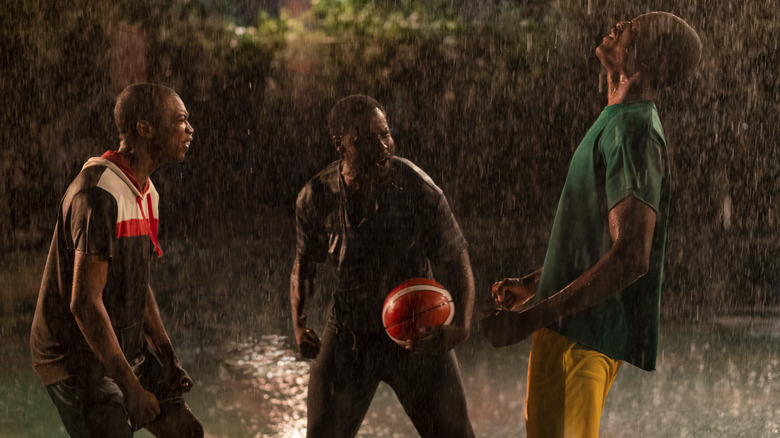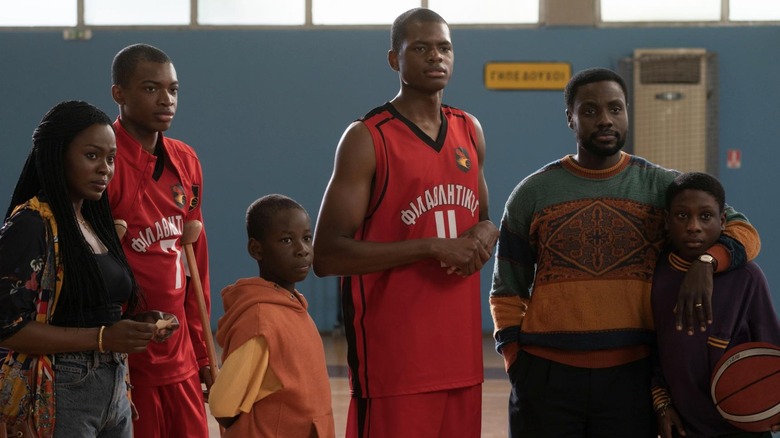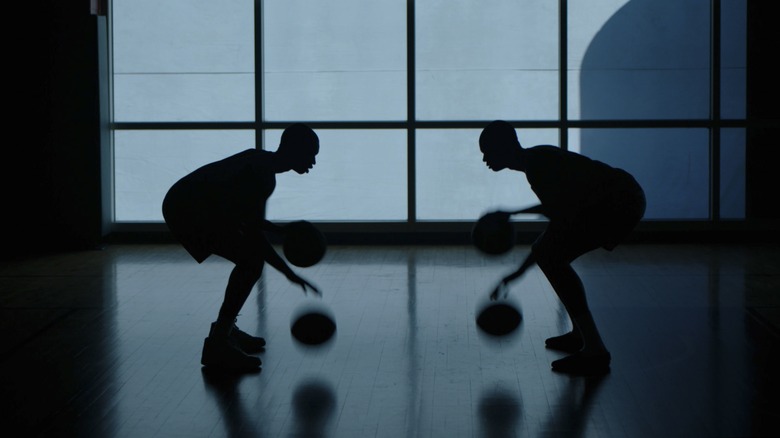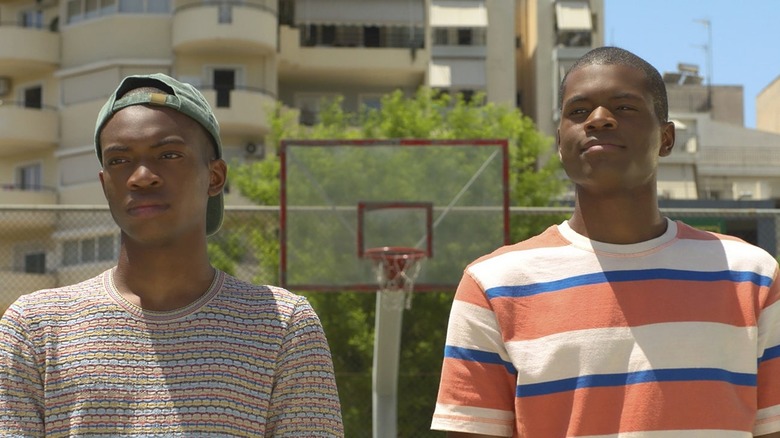Rise Composer Ré Olunuga Wants To Convey The Truth [Interview]
Composer Ré Olunuga had a complicated dance with his first major studio film, "Rise." The drama, which tells the true story of the Antetokounmpo family, is an ensemble film spanning many years, visits different counties, and has an ending anyone vaguely familiar with the NBA already knows. For anyone not remotely familiar with professional basketball, Giannis, Thanasis, and Alex Antetokounmpo are NBA stars. They are the first trio of brothers to win the championship in NBA history.
It was the brothers' loving parents, Charles (Dayo Okeniyi) and Vera (Yetide Badaki), who helped instill such a powerful drive in the athletes. It was a drive, a rhythm that Olunuga wanted to musically express in Akin Omotoso's film. Rhythm as motif — that was the composer's ambition for his emotional but gentle score. Recently, Olunuga talked to us about his work on the Disney+ film, staying true to performances and the real people involved, and his love for composing movies.
'It's a bit of a psychological dance'
Great use of piano here. It's not too much, not too little during very emotional scenes.
That was what we were going for. As you can tell, the film is an intimate story. It's really about this family, and I wanted the melodies to be there. I wanted it to be lyrical, because it is a story, but I think when you're dealing with a real life, something that people lived, there is this consideration you have to have for not dramatizing it, not making it this fantasy. When writing this score, that was my main goal, to have it feel real all the way through and truly express it. It was actually two pianos, but played so softly. You could hear every mechanical sound all the way through.
What made you go with those two pianos instead of just one?
It was partly a stylistic choice. I ended up writing for two pianos because the way two players can interact with really soft melodies feels so much like a conversation, feels so human. Not every film I work on connects with that stylistic idea or approach, but this one absolutely did, because it was a family and there were so many conversations between members of the family. So many things that Vera, especially, their mom, had to say that were deeply emotional. I wanted to evoke that while still keeping it textural, while it's still feeling like it's not just emotions, it's actually a conversation.
You express the pain in the music, too, especially in the kitchen scene where Vera talks about the hard choice she made.
Yeah, exactly. We had this huge orchestra, but it only comes in at the end. This symphony comes in, because at the end, it's very hopeful, because you know, Giannis says to his mom, "Don't worry, I'll reunite the family." That little bit of hope at the end of that cue, of that piece of music, I think it was a turning point in the film. In their story, it was also this moment where you see that Giannis decided that, "Yes, I'm going to absolutely commit to this and go as far as I can go." What's beautiful about this story is that it worked. It panned out. Everything worked out. It was beautiful.
What are some challenges to scoring a true story?
I think there are challenges that are fun when you're working with a real life story, because, for example, I was at the premiere yesterday, and it was the first time that a whole bunch of people who hadn't seen the film or worked on the film saw the film for the first time. Giannis was there at the premiere, and everybody obviously knows who he is. Most people know he got drafted, but I had to create this sense of tension when they were calling all these other names because he was called on 15th. How do you do that when everyone already knows how this turned out? He literally just won a championship a year ago.
And it was one of the greatest championship performances ever.
Exactly. Really famous person. How do I get an audience feeling like, "Is he going to get drafted? Is it going to happen?" It's a bit of a psychological dance because you can't go too far in terms of evoking the emotions, but you can't be too restrained as well, or if the audience just leans on their knowledge.
I had to write this very textural, soft, almost subconscious, threads of music that felt more atmospheric than anything else. Every time I watch it with people and I see them tense up in those moments, and then he gets drafted and there's this huge applause in the room, and people were so relieved, it feels good as a composer witnessing that. It's almost like you've defeated the sense of reality, if that makes sense. They've fully lost themselves in the emotions of the film and emotions of the story.
It was one of the challenges: How do I write emotional narratives when everybody already knows what happened? It's a testament to the film that Akin made as well, because he treated the whole story of love, so everybody else had no choice. That's generally how I like to approach things, but it's a plus from the director and producers when there is this warm embrace of treating the story, the audience and crew members, everyone just making sure that the being at the core is love.
'You don't sleep because you just want to keep experimenting'
What instruments did you want to lean on to express the love between the family?
There are a few things that I explored in this film. This is my first major studio film, so it meant that I had resources available to me, just a varied toolkit. We already spoke about pianos, and that being a very important part of the storytelling, but there was this idea that I've had for a long time that I've always wanted to see in film. It's really something for music nerds more than anything else, but it's using rhythm as motif.
How'd you create that motif?
I wanted to take a particular rhythm, and it can play on the drums, it can play on the pianos. It was like, da da, da da da, da da, da da da da, da. So, that rhythm, you hear it right at the start, the first time Giannis picks up a basketball, and there's a big swell, but you hear this thing on pianos. It comes back with the drums and it comes with horns and it comes with strings. More than the melody, the thing that was woven all the way through was that rhythm, because for me, it represented hope.
It represented hope and it represented this forward drive that he's had, but the entire family had as well that kept them just trusting each other and supporting each other, because there were risks. There were difficult choices that had to be made. But when those crossroads came, they always chose hope. They always chose moving forward and working harder. I just used that rhythm to keep it driving, just keep the story driving forward and for you to feel like they're moving towards a happy future.
How long have you been wanting to score a film using rhythm as a motif?
I think that I've had it in my head for a very long time, but there hasn't been a film that felt just right until this one. I think with a lot of composers, you have all kinds of questions in your head of, "What would that sound like? What would that feel like?" You can either just write something for yourself, but it's always, when you're a film composer, when a story comes along that connects with something deep inside you in your heart, but also in your mind, just your theoretical curiosities, just music theory curiosities, it's like you don't sleep.
You don't sleep because you just want to keep experimenting. You want to keep trying to have the fullest version of that idea, for the best version of that idea comes out. The first time I thought about using rhythm as a motif was maybe 12 years ago. I grew up in Lagos, and the rhythm of that city ... I don't know how this is going to sound, but the thing about music in general and the power of music is how easy it is for it to penetrate, you know? Because there is this specific intelligence that almost everyone has. If you're a hearing person, you understand the emotions inherent to a piece of music.
Even if you're a baby, you understand. It is a language that is so instinctive. It's powerful. It's a huge part of why I love what I do. Taking that power and being intentional about using rhythm, it's almost like you're putting rhythm into a person's body. You're putting rhythm into a way a person is feeling, and doing it not for dance or something escapist, but for storytelling. And the way that we got to do it with this film, it's like alchemy. It's almost like puppeteering, in a good way. You're trying to move the audience physically, not just emotionally, with rhythm. I can talk about this for a long time.
Please, keep going.
I'm obsessed with it, you know? Because I write a melody and then sometimes I go in again and I think about the rhythm of that melody, I think about just that other layer of experience of how it's going to make a person want to move, the sort of inertia that the person is going to feel when they're listening to it. Does it make them want to slow down? Does it make them want to move forward? We got to explore that a lot in this film.
Stillness is important as well. Some of those melodies were for that. When Vera's telling her story, I wanted the audience to be still while listening to a melody, just lost in it, fully caught in that experience of, well, what it must have been like to have to leave your baby behind. It's such a huge sacrifice, such a painful choice to make and to carry. I wanted the audience to really be there with them, specifically Vera in that moment, so it had to be a very still moment with music.
I usually hear writers and directors talk about being faithful and respectful to a true story, but as a composer, that responsibility must be different, especially without talking to the real people involved. Like, the question of, how do you accurately communicate what's going on internally?
For sure. These are real humans who are walking around right now who went through these things. You can't make it seem fictional. I had to consider that, but then I had to be in tandem with the performances as well. The performances are so, so great. I think being a composer, it's a little bit like acting with my philosophy. The music is a performance in the film if you're doing it right. It can be very subtle, it can be very strong and powerful, but it is a performance. It has to work in collaboration with what's on screen and with the performance that is happening on screen. With something that is a true story, a real life and lived experience, the respect has to be there. It just has to be. You have to be subtle and gentle, but convey the truth. Convey the truth.
'My job, really, is to be a spokesperson for the audience'
Since you're obsessed with rhythm, was that a part of why you were drawn to scoring films?
Rhythm is just one of my obsessions. I think the core obsession is storytelling. Compulsion might be the more accurate word, because it's just a compulsion. I could be doing anything in the world right now, but I'm feeling compelled to tell these stories through music or help other people tell stories with music that I write.
Film is right now the most powerful medium that we have for telling stories, and hey, who knows what's going to happen in the future with technology? But right now, cinema is still at the top. The thing about film that I love is that you have this window, you have this span of time, and that span of time is fixed. You know the arc of where everything is. I can look at it, look at the emotions and be very analytical. I can go through the entire journey. I can write something at the end and think about it again in context at the start. I can think about the middle and the context of what's going to happen after.
You can take your time in taking people through this journey. It's very different from most other mediums of storytelling because it is fixed, but it's so rich. It's so rich, all these layers of storytelling that are happening with the actors and with the editing and with visual effects and sound effects and geography changes, because this film happens in multiple places as well. That type of rich, textured storytelling is the closest in reality that we have, but it's fixed. It's not real. It's not really real, where you're in a theater and you have to just do it. This is a fixed thing. I love that. I love being able to revise and revisit and try and get it right. I don't know if that answer made sense. You know what I'm saying?
I know what you're saying. So, with that analytical approach, how do you find the balance between analyzation and intuition as a composer?
Man, intuition is a huge part of it, but experience is also a huge part of it. I think the experience of being a film lover is that you bring that into your writing process. My job, really, is to be a spokesperson for the audience, for the emotional needs of the audience when I'm in that room, because the director wants something. I'm getting his or her vision. The producers of the studio, they want something and I get their vision.
There is a lot to work with on the screen with the performances and with the story, but I have to maintain a sense of what the audience needs to connect with the scene. I have to thread a line through all of that and find a piece of music that does that without overshooting it, and everybody needs to be happy, everybody involved, including me. I need to be happy. I want it to be a piece of music that I enjoy writing.
I love cinema, so I want to watch a piece of a scene and hear a piece of music inside that and still feel like it's a great scene, and stack a few of those together, I'm like, "That's a great film." That's what I want to feel. I'm often just holding those different mentalities in my head, "Okay, what does the audience want? What do I think the audience wants? What's the director want? What do the producers want, and what do I want as well?" Music comes out. So, to answer your question, a huge part of it is intuition.
I would say the strongest part of it is my sense of being an advocate for the audience when I'm in those creative conversations. I could really love something and know that the audience, they might not have the same influences or experiences I have had. So, I need to get right to the limit of what exists in cinematic language, the music language that already exists, and contribute to it, just add a little bit beyond that limit.
Your career does go beyond film, like the work you're doing with the Lagos Philharmonic. What are you working on and excited about at the moment?
I'm working on a few films. I have a film called "Girl" that I'm working on for BBC Film. I'm really enjoying working on that. But, yes, a long-running project that I've been doing is building a symphony orchestra for Lagos, the Lagos Philharmonic. It's at the heart of everything that I do. I get to tell these stories and work with amazing people all over the world, and I want to make sure that more people have the opportunity to contribute to these artistic conversations that are going on.
A huge part of that is setting up institutions that train and expose and give musicians the careers that they should have. It's just a start, you know? It's just one tool that'll be available for people like me and others. I can't wait. You mentioning that, I'm getting lost in the memories again and thinking about all the things I need to do. Yeah, that's the biggest thing for me, the Lagos Philharmonic.
"Rise" is now available to stream on Disney+.



